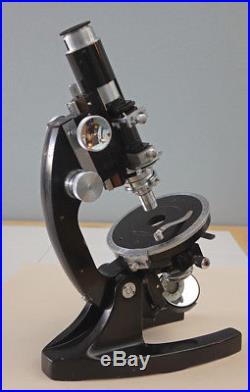
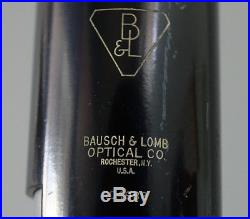
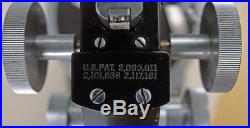
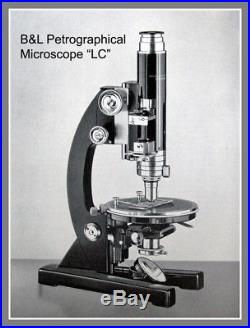
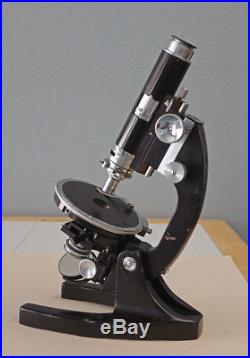
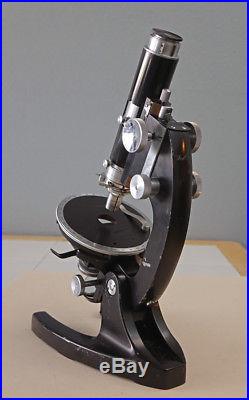
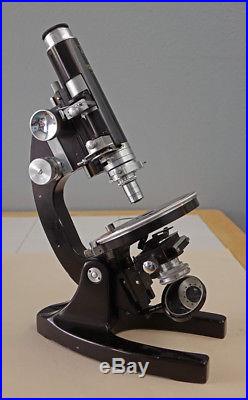
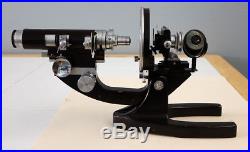
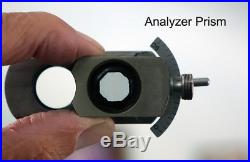
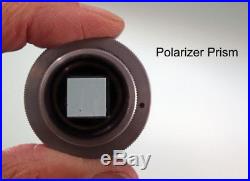
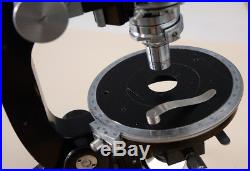

BAUSCH & LOMB VINTAGE “LC” PETROGRAPHIC POLARIZING RESEARCH MICROSCOPE – 1954. SUPERB BAUSCH & LOMB VINTAGE RESEARCH MODEL LC PETROGRAPHIC POLARIZING MICROSCOPE 1954. This model instrument was second only in size and complexity to their top of the line Model LD Research Petrographic Polarizing Microscope. It is a very large, impressive, and superbly engineered instrument that is still fully functional to this day. Also, this instrument bears the serial number, RD4988. This serial number dates the microscope to the year 1954. In addition, three (3) US Patent numbers are found on a plaque at the top of the limb (see image). 2,093,611, 2,101935, and 2,117,161. The first Patent number refers to a patent granted to H. Kurtz dated September 21, 1937 and assigned to the Bausch & Lomb Optical Co. For the fine focus mechanism used on this instrument. The second patent number refers to a patent granted to G. B Gallasch dated December 14, 1937 and assigned to B&L for the body tube attachment mechanism used on this microscope. The last patent number refers to a patent granted to G. Kurtz dated May 10, 1938 and assigned to B&L for the body tube slide mechanism used on this model microscope. NOTE: We will provide complete copies of each of these US Patents along with the microscope. As is mentioned in the 2003 publication entitled, The Petrographic Microscope: Evolution of a Mineralogical Research Instrument by Daniel E. Kile, petrographic microscopes and accessories are comparatively rare. So, for every 100 biological microscopes manufactured, perhaps only one was made for petrographic use. In addition, petrographic microscopes are much more complicated than biological microscopes. Although the magnifying powers used are comparable and not so great, there are attached appliances for special examination of mineral or chemical substances that require very careful adjustment. This vintage Bausch & Lomb specialty microscope is equipped with such special features as a rotating circular stage with vernier scale, an adjustable prism analyzer system, an adjustable and focusable Bertrand Lens with iris diaphragm, a rotating substage prism polarizer with Abbe condenser on a sliding dovetail bar, a focusing crosshair eyepiece, an objective lens in a centering adaptor and a port above the objective holder to accommodate special optional accessories (sliders or compensators) needed for the microscopic analysis of minerals. Petrographic polarizing microscopes first made their appearance in Europe and the UK in the latter decades of the 19th Century. Such prominent microscope manufacturers as Nachet, Fuess, Lietz, Leiss, Zeiss, Reichert, Siebert, Watson, Swift & Son and others all produced their own versions of this specialty instrument. American microscope makers especially B&L and Spencer were soon to follow suit with their own versions of this specialty microscope. In the late 1890s Bausch & Lomb entered into a special cooperative business relationship with Zeiss in Germany, which allowed them to acquire some of the special technical expertise needed to produce a new line of petrographic polarizing microscopes in the USA. In addition, B&L used the design of Dr. Wright from the Carnegie Institution of Washington, D. To produce their own unique line of petrological polarizing microscopes. The end result was the introduction of the L series of Petrographic Polarizing Microscopes. This line ultimately included the Chemical model M with an eye-cap analyzer, the LA with a body tube analyzer, the LB and LC with a built-in rotating analyzer and the very sophisticated LD with a device for the simultaneous rotation of both the analyzer and polarizer. The LA and LB were considered basic models, while the LC and LD were designed more for research. By the mid-1960s, the designs were changed, doing away with the use of polarizing prisms with the substitution of Polaroid films for the analyzer and polarizer. The line was renamed the LM Dynoptic Polarizing Microscope series. Offered here is a nice example of a Model LC Research Petrographic Polarizing Microscope from the early 1950s. Accompanying this listing is a catalogue cut of the B&L Model LC extracted from my personal copy of the Bausch & Lomb Scientific Instruments Catalog D-111 published in 1940. B&L described the LC model as follows: The LC Polarizing Microscope has been designed to offer an instrument provided with the optics and precision required for research work in general, yet sturdy enough for years of routine work in teaching or industry. The similarities to the listed instrument are readily apparent. For the vintage / antique microscope collector this B&L Research Model LC Petrographic Polarizing Microscope represents one of several significant advances in the evolution and design of this specialty microscope offered by the US based Bausch & Lomb Optical Company. As such, it will be a most welcome and valuable addition to any vintage / antique microscope collection, especially one with an emphasis on petrographic polarizing microscopes. This microscope is built upon a nicely sculpted long linear and heavy V-shaped base with an integral short trapezoid shaped plate-pillar that that terminates in a compass joint. This joint supports the rest of the microscope, including a gently sweeping semicircular arm. The curved arm provides an abundance of working space at the stage and adequately accommodates an optional Federoff Universal Stage. The top of the limb supports the body tube with the focusing mechanisms. The lower end of the limb supports the circular rotating stage and a complex substage assembly with illuminating apparatus. The compass joint allows the microscope to be tilted at any angle from the vertical to allow for the comfortable viewing of specimen slides mounted atop the stage. Coarse focus is by rack and pinion controlled by means of a pair of milled heads found at the top of the limb. Fine adjustment is by a pair of micrometer knobs that are mounted near the top of the limb, but below and behind the coarse focus knobs. The right fine focus control knob is inscribed with a vernier scale that allows the observer to note and to return to a specific fine focus position, if desired. Each increment of fine focus represents 0.002mm (2 micons) of motion. This greatly simplifies measurements of depth and thickness of observed specimens. The microscope is equipped with a large 125mm diameter ball-bearing circular rotating stage with an engraved vernier scale on the periphery. The stage circumference is graduated in single degrees with each tenth line numbered. A single control knob on the right rear of the stage is provided to arrest the stage rotation in a specific position, if desired. The top of the stage has provisions for mounting slide clips, a mechanical stage or even a large Federoff Universal Stage. This instrument is equipped with a single slide clip. Below the stage is a relatively complex Abbe condenser system along with a prism polarizer mounted on a brass bar that can be raised or lowered towards or away from the stage by means of a rack & pinion system controlled by a control knob found on the left side of the microscope. On top of this array is a dovetail mounted condenser system consisting of a 0.10 N. Flip-out top lens of the condenser that is controlled by a lever that extends from the right side of the assembly (Note: This lens is missing from this instrument). Under the flip-out condenser lens is a lever that controls an optical mask or shadow plate that allows the observer to completely close off the light from the illumination system for use when observing large opaque specimens or to facilitate Becke line tests for index measurements. Under this is an iris diaphragm that is controlled by a lever found on the front side of the instrument. This leaves a 0.28 N. Condenser, which is used to illuminate the larger field of view required when working with 16mm and larger mm objective lenses. The dovetail slider can be completely removed from the instrument, if desired, by sliding it laterally off of the instrument. Beneath the condenser diaphragm is a cylindrical polarizer containing a Glan Thompson prism in a revolving mount with a graduated scale engraved around its circumference. The lower end of the polarizer is equipped with its own iris diaphragm that is controlled by a peripheral knurled ring. Under this assembly is a 50mm plano-concave mirror on a moveable mirror bar that completes the substage illumination system. The mirror bar can be moved to the right or left to provide oblique illumination, if desired. This instrument is equipped with a large diameter (39mm) body tube that is quite complex with a lot of special features. At the top of the body tube is a nickel-plated brass ocular holder with two slots in its upper edge set a few degrees apart. This feature is designed for fixing the azimuth of a cross hair eyepiece. Included with the microscope is a single 30mm diameter 10x focusing Huygenian ocular with internal cross hair. This ocular has a set pin mounted on the side of the barrel. This pin permits the ocular to fit into either one of the slots in the ocular holder. Gently twisting and moving the internal lens barrel up or down focuses the cross hair of the eyepiece. Below the ocular holder is a Bertrand lens mounted on a slider so it can be moved either in or out of the optical path. Two (2) adjustment points are found at the end of the slider that allows the Bertrand lens to be precisely centered in the optical path. The Bertrand lens is also equipped with an iris diaphragm and the slider port is equipped with a dust shield. In addition, the lens is focused by moving the entire box slider containing the lens either up or down within the body tube. Near the bottom of the body tube is an analyzer box slider that slides in or out of the optical path within the body tube. The analyzer is an Ahrens prism, which can be rotated 90 degrees. The prism is set in a sliding prism box that is engraved with graduations and an indicator that enables withdrawal and return to the optical axis without disturbing the reading on the scale. Graduations are in 5-degree partitions, with every tenth line numbered at 0, 45 and 90 degrees. The analyzer port is also equipped with a dust shield. At the lower end of the body tube is a special Quick Change holder that accepts individual objectives equipped with special centering mounts. The exact position of each objective in the optical path can be finely adjusted horizontally with a pair of adjustment points found on either side of the objective mount. A single Spencer 16mm objective with mount is included with this instrument. Immediately above the objective holder is a slot for polarizing accessories (compensators). However, no compensators are included with this microscope. When set up or observations, this instrument stands about 15 inches tall and it weighs 17 pounds making for a relatively heavy vintage POL microscope. There is no wood case or any other accessories that accompany this instrument. NOTE: The accompanying images, which were captured under ambient light conditions, are a part of this statement of condition. Please take the time to view all of the images so you can confirm the condition of the instrument and so you will know exactly what you will be getting should you prove to be the proud new owner of this very fine B&L Research Model LC Petrographic Polarizing microscope. In summary, this microscope is in very good condition cosmetically, mechanically and optically, but with a few relatively minor caveats as follows. As the accompanying images attest, the black lacquered metal and nickel-plated brass parts on this instrument are in very good condition and are for the most part free of any significant noticeable imperfections. However, quite typically, the black lacquered metal parts have some scratches, rub marks, dings and minor chips in the lacquer from use over time. The optics associated with this microscope are of very high quality. Both the eyepiece and the objective lens are free of any optical defects and are cosmetically in very nice condition. The delicate cross hair in the eyepiece is present. The prisms in both the analyzer and the polarizer are in excellent condition with no evidence of any prism disease (see close-up images of both prisms). The Bertrand lens is in excellent condition. As was noted above, the 1.10 NA flip-out/flip-in top lens in the condenser is missing from the instrument, but the lower 0.28 NA condenser is present and is in excellent condition. It very nicely matches the 16mm objective lens included with the microscope. Both sides of the plano-concave mirror are in very good condition. This instrument produces sharp, high contrast polarized images. In fact, this microscope can still be used for serious petrographical investigations to this day. In proof thereof, accompanying this listing is a composite image of a thin section of the mineral Pryroxenite captured under polarized light using this very instrument. Fine details in the mineral specimen are very nicely resolved. Mechanically, both the coarse and fine focus mechanisms work smoothly and flawlessly on this instrument. The stage rotates freely and the arrest mechanism works as it should. The substage rack and pinion system works smoothly. The iris diaphragms in the substage illumination system work flawlessly and the diaphragm blades are free of any tarnish or rust. Overall, this is a very nicely preserved example of a vintage Bausch & Lomb Model LC Research Petrographic Polarizing Microscope. It is most certainly worthy of any antique/vintage microscope collection. And, should one choose to do so, it can still be used to this day for the serious examination and analysis of minerals under polarized light. We will also entertain reasonable offers for this magnificent instrument. FREE scheduling, supersized images and templates. Get Vendio Sales Manager. Make your listings stand out with FREE Vendio custom templates! Over 100,000,000 served. Get FREE counters from Vendio today! The item “BAUSCH & LOMB VINTAGE LC PETROGRAPHIC POLARIZING RESEARCH MICROSCOPE 1954″ is in sale since Monday, June 25, 2018. This item is in the category “Business & Industrial\Healthcare, Lab & Life Science\Lab Equipment\Microscopes”. The seller is “mtloggera” and is located in Hamilton, Montana. This item can be shipped worldwide.
- Optical/Digital: Optical
- Model: Model LC Petrographic Polarizing Research Microscope
- Country/Region of Manufacture: United States
- Optical Microscope Type: Compound Microscope
- Brand: Bausch + Lomb
 If you like this post and would like to receive updates from this blog, please subscribe our feed.
If you like this post and would like to receive updates from this blog, please subscribe our feed.
